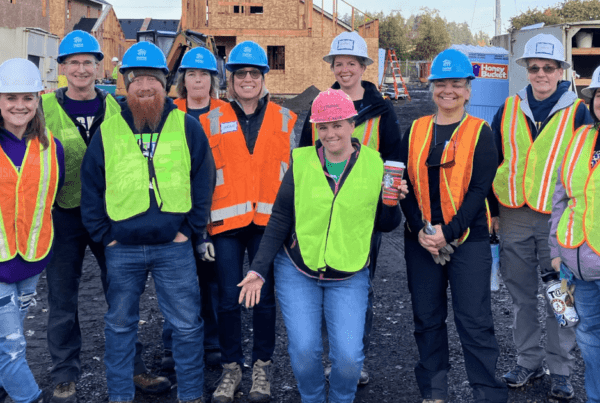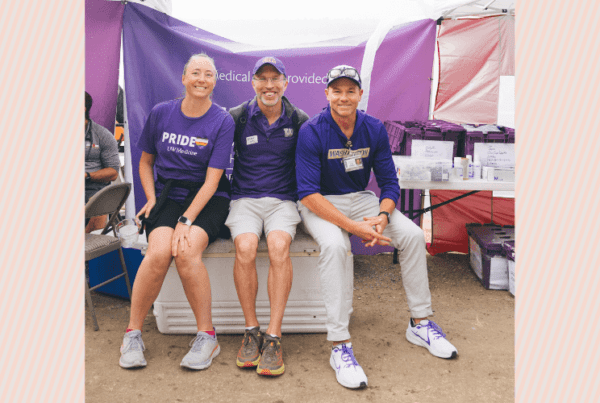Black women, on average, are diagnosed with breast cancer earlier than non-Black people, but it can be harder to access the care they need to get early diagnosis and treatment.
In 2021, UW Medicine Primary Care and Population Health employed health navigators to help more Black women get breast cancer screenings. The health navigators facilitate outreach to this community, working directly with community members and BIPOC organizations to ensure the outreach is both culturally relevant and responsive.
Employees working on this initiative have seen the successes and challenges that come with trying to make mammograms and breast cancer screenings equitable and accessible — and Jerry Wood, who uses they/them pronouns, and is a central panel navigator for Equity & Special Projects for UW Medicine Primary Care and Population Health, is no exception.
Working to increase mammogram access
As the outreach began, Wood became the point person in mammogram ordering and scheduling for the UW Medicine Primary Care Panel Navigator team. Collaborating with Gabrielle Flowers, the Breast Health Equity program manager at Fred Hutchinson Cancer Center. Together, they worked to ensure that the team used proper workflows and appropriate access to schedule the patients in a timely manner.
“We develop strategies to increase access for our most marginalized patients,” says Wood. “I also engage with the community at health fairs and events to promote cancer prevention and provide educational materials.”
At these events, they can also schedule mammograms and wellness visits.
The impact of the work
In addition to increasing access to breast cancer screening resources that BIPOC communities, Black women specifically, might not otherwise have, Wood acknowledges that their level of impact also depends on a team’s ability to reflect on their mistakes along the way.
“I also measure our impact on less tangible deliverables like awareness and education,” says Wood. “We can’t really quantify this measure, but the more we talk about these disparities internally, the more space we can provide to empower patients to approach their health from a place of ownership.”
In the end, Wood says that holding themselves and the organization accountable is one of the most important actions their team can take.
Personal challenges faced during outreach
Wood is aware of the differences between them and the communities they serve, but they don’t let this deter them from the work. In fact — they acknowledge them.
“Personally, my biggest challenge is that I’m a white, masculine-ish-sounding person who does outreach to schedule and discuss challenges around mammograms,” they say. “This is coupled with the lack of trust this population has for the medical industry. I completely understand why these challenges exist, but the best tactic I can use is being as empathic and sympathetic as possible.”
Wood notes: “It’s also important that I state I will never understand the experience of a Black woman.”
Understanding this sentiment is crucial to this work, and to anyone dedicated to promoting equity in all spaces. However, the spaces provide their own challenges, as Wood describes access as a major problem within certain areas.
“Once you pass First Hill, the number of facilities that offer mammograms greatly declines,” says Wood. “While we work closely with Fred Hutch and their mobile mammography, we still run into the issue of not having enough time slots to screen all overdue patients. Scheduling is challenging because there are a lot of moving parts.”
Celebrating successes
Wood’s work is crucial to the program, which increased overall screening rates by 2.8%, with 1,170 patients being added to the pool of screened individuals, in part due to their assistance.
“I consider each scan, every epiphany and conversation a success,” says Wood. “Once a seed is planted, we can continue cultivating a culture of understanding between our consortium and the Black women we serve.”
Wood recognizes Ale’ Jenkins and Gabrielle Flowers as some of the initiative’s greatest assets because of their shared lived experiences with this population. They acknowledge that finding ways to support Jenkins’ and Flowers’ work within the BIPOC community is one of their greater keys to success.
A call for action, not hope
Wood wants more Black women to feel empowered to speak up for their health and comfort and that the staff will be receptive to their needs.
“I’ve heard many times that technologists are dismissive of painful or uncomfortable experiences in the mammography unit or providers not listening to our patients’ concerns,” they say. Through empathy and building a culture of understanding, they hope less Black women will have these experiences around mammograms.
Ultimately, the work that Wood does for communities who don’t have equal access, education and resources for breast cancer and mammogram screenings is just that — work.
“I’m not invested in hope. Without real effort from every part of UW Medicine, hope is pointless without action.”
To learn more about the initiative to make mammograms more accessible to Black women and hear actionable insights for how to engage with community members you wish to serve, listen to this podcast featuring Nkem Akinsoto, Assistant Director at UW Medicine Primary Care and Population Health, and Vicky Fang, MD.


